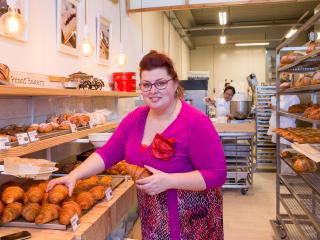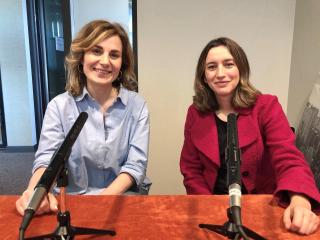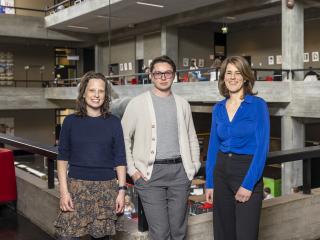1963 and the genesis of the Schools of Law and Social Sciences
Preparations to establish a Law School in Tilburg, as part of the then Roman Catholic School of Economics (Katholieke Economische Hogeschool) started as early as in 1959. The deliberations took place in the School buildings in the Tilburg city center. Within a few years, the School of Economics moved to a brand-new campus (1962) and its name was changed because of the establishment of the Schools of Social Sciences and of Law in 1963.
Authors: Joep van Gennip and Pieter Siebers
In the Spring of 1959, a memo was published by Tilburg professors who had investigated in what academic directions the School of Economics could be expanded. They argued that the best option would be to choose a discipline connected to the existing economic programs, in which the philosophical (i.e., Catholic) aspect also had to be taken into account. This latter aspect was mainly expressed in the availability of philosophical programs in both the Bachelor’s and Master’s phase of the new Law School’s curriculum. Similar programs already existed at the Tilburg School of Economics and the recently established School of Social Sciences. The commission hastened to emphasize that they hoped the University of Nijmegen (that had already set up a Law School in 1923) would not in any way be offended by Tilburg’s plans for a Law School.
Professor J.M. Pieters headed the ‘Law School Preparation Commission’
Appointment of a ‘Law School Preparation Commission’
Tilburg’s Law School plans gained momentum when, in 1959, the Piekaar Commission (named after its chair, the Director-General of Science Policy at the Dutch Ministry of Education, Art and Science) advised the government to establish Law Schools at both the Tilburg and Rotterdam Schools of Economics. Supported by this recommendation, the Tilburg University curatorium – a governing board similar to what is now the Executive Board – ordered the Senate (i.e., the university’s body of professors) to set up a working group to prepare for the establishment of such a Law School. The curatorium added optimistically that it could be inaugurated in September, at the opening of the academic year in 1961. Professor J.M. Pieters headed the ‘Law School Preparation Commission’.
Cobbenhagen’s alma mater, the Dutch School of Economics in Rotterdam, had also been promised a Law School by the Piekaar Commission. However, the seaport city also wanted a Medical School. The debate in Parliament on the Bill to expand scientific education in the Netherlands, including the Law Schools, was seriously delayed as a result.
Mutual exchanges with and elective courses at the Schools of Economics and Social Sciences were also possibilities. It was an early instance of interdisciplinary exchange, that is encouraged among our students to this day.
Early instance of interdisciplinarity
The Tilburg ‘Law School Preparation Commission’ was able to use this temporary delay to its advantage by preparing meticulously for the establishment of the Law School. The planned starting date of September 1961 – which was infeasible anyway – was abandoned. At the same time, debates with Rotterdam were intensified and in Nijmegen potential problems were ironed out, among other things, in the context of several new Tilburg professorships, since there were many candidates but only few positions. Other than in Rotterdam, where the legal curriculum was experimental in nature, Tilburg had a traditional legal curriculum in mind, with subjects like Dutch and Roman Law, supplemented with Tax Law and special subjects in Public Administration, for which subject a case law database was already available in Tilburg. Mutual exchanges with and elective courses at the Schools of Economics and Social Sciences were also possibilities. It was an early instance of interdisciplinary exchange, that is encouraged among our students to this day.
The first Dutch Law graduate of the Law School, A. van der Put, receives his diploma on April 22, 1968 (Academic Heritage Collection, photographer: Rien Siers).
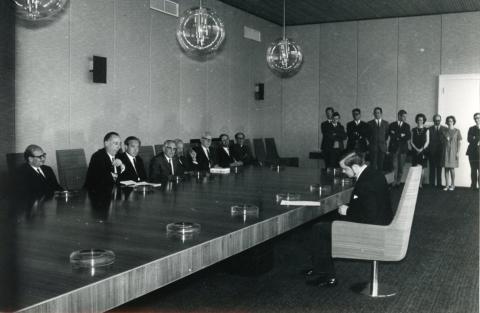
Opening a Law School in Tilburg
In May 1963, the Act establishing the Law Schools was passed and, in September, the first nineteen students started attending lectures in Brabant. In the first two academic years, (1963-1964 and 1964-1965), 68 students studied at the Law School, 52 were men, only 16 were women. J. van Dijck had been recruited to teach Tax Law and Private Law, A. Olde Kalter for Roman Law, and H. Jeukens for Dutch Law and Comparative Constitutional Law. In 1964, C. Bronkhorst was appointed to lecture in Criminal Law and Criminal Procedure and H. Schoordijk taught Civil Law and Private International Law. Canon Law was not on the curriculum; the School did not want to infringe on a subject traditionally taught at Nijmegen University.
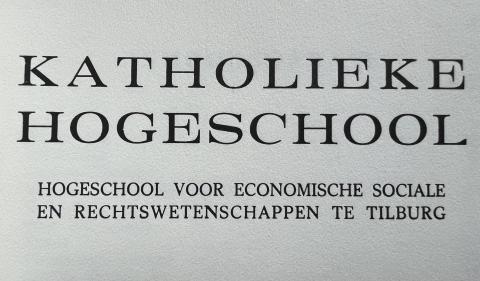
However, the institution was soon informally referred to as the Tilburg Catholic Academy
A change of name
The only thing that remained to be done for the Catholic School of Economics was change its name. Jo Cals, the Minister of Education, Arts and Science at the time, had already hinted in March 1963 that the Tilburg School would be wise not to change its name, so as not to create the impression that the educational institution also offered a variety of specialties within the Social Sciences and Law. Its sister institution in the West had already changed its name from Dutch School of Economics Rotterdam to School for Social Sciences (Hogeschool voor maatschappijwetenschappen). Tilburg had alluded to a similar name.
In November 1960, when Pieters’ Preparation Commission had been working on expanding the School for some time, one of the Commission’s members had already suggested to rename the Tilburg institution ‘Catholic School for Social Sciences’ (Katholieke Hogeschool voor Maatschappijwetenschappen). Some else suggested ‘Catholic School for Economic and Social Sciences and Law’ (Katholieke Hogeschool voor Economische, Sociale en Rechtswetenschappen). Although it was the eve of the tumultuous 1960s, it seems the designation ‘Catholic’ needed to be retained. However, the institution was soon informally referred to as the Tilburg Catholic Academy (Katholieke Hogeschool Tilburg).
Establishment of a Social Department
If a second School were to be added to the Roomsch Katholieke Handelshoogeschool that had been established in 1927, it should be dedicated to no other discipline than the Social Sciences. Right from the start, founding father Cobbenhagen, who wrote the institution’s first educational program, had been especially interested in the perspectives of the Social Sciences. Sociology was one of the four compulsory subjects of the Master’s exam (the other three being Economics, Business Studies, and Private Law). Cobbenhagen himself, who had been educated as an economist in Rotterdam and worked as a Professor of Economics in Tilburg, became president of the Dutch Sociology Association (Nederlandse Sociologische Vereniging) in 1946. This appointment was in line with his commitment to making the School an academic institution that addressed social issues from a broader perspective than economics alone. Moreover, in the first academic year after the Second World War, the institution’s Senate had advocated creating a School of Social and Political Sciences.
The curatorium thought that wish would be going too far, but the plan inspired Cobbenhagen to set up a Social Department. It is first mentioned in the course catalog of the academic year 1949-1950. Apart from economic subjects, courses on Sociology, Social Law and Social Politics, and Social Psychology were offered. Without a doubt, the seed for the School of Social Sciences, established in 1963, was planted here. Not every Tilburg professor was thrilled, though. A discipline like Sociology was initially regarded with some disdain by many, notwithstanding the fact that the French sociologist Durkheim was considered an important thinker on issues such as social cohesion even then.
Moreover, it was an impediment to these developments that a School of Social Sciences had been established in Nijmegen in 1953, which raised potential coordination and competition issues. When the Ministry in the person of Director-General Piekaar also expressed a lack of insight into job prospects for sociology graduates, Tilburg’s hopes were dashed.
Text continues below photo

The campus in 1974. Social Sciences and Law were initially accommodated in what is now Koopmans building and later partly in one of the temporary wooden buildings, at left.
Statutory recognition of the Schools of Social Sciences
In the 1960 Bill on higher education, no mention was made of Schools of Social Sciences. However, the resistance to the Bill, fueled considerably by the curatorium, led to the so-called Vermooten amendment. In it, this Protestant social geographer, a member of the Dutch Labor Party PvdA, advocated the statutory recognition of Schools of Social Sciences. Although Education Minister Cals advised against the proposal, a broad parliamentary majority was in favor, paving the way for the Social Department to become a full-fledged School of Social Sciences.
The curatorium did not lose any time and established the School of Social Sciences on May 12, 1961. To avoid any misunderstanding, the Ministry was informed. A discussion ensued about the academic status which the Tilburg institution would acquire from the moment it consisted of oher Schools besides the School of Economics. However, since neither Minister Cals nor the Ministry had any intention of adapting the University Statute, this meant that, for the time being, graduates would be awarded degrees in Economics only. The first PhD at this time was earned in 1961 by later Rector Magnificus Ruud de Moor, who received an ‘economic’ PhD for his PhD thesis entitled De verklaring van het conflict. Een onderzoek naar de uitgangspunten van de sociologische theorie [Explaining conflict. A study of the principles of sociological theory].
The Tilburg curatorium briefly considered raising an objection against the stalling but, knowing that the School could no longer elude them, it let the matter rest. And so 1963 rolled around, with Ruud de Moor, having in the meantime been appointed Professor of Theory and History of General Sociology, as a member of the new School Board. The School was to grow steadily and was extended again in 1971 with the sub-School of Psychology.
Date of publication: 13 June 2023

